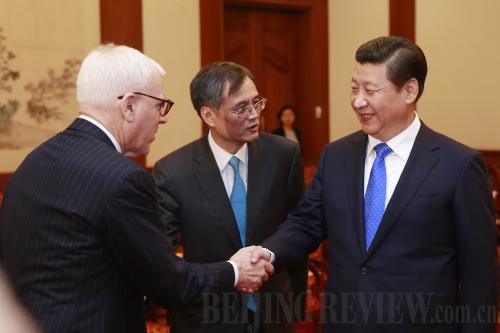|
 |
|
ALL EARS: Chinese President Xi Jinping receives foreign consultants of the School of Economics and Management of Tsinghua University in Beijing on October 23, 2013 (SHENG JIAPENG) |
On April 19, the National School of Development at Peking University celebrated its 20th anniversary. Six foreign-educated economists, including Justin Yifu Lin, who went on to become the first chief economist and senior vice president of the World Bank from a developing country in 2008, founded the school as the China Center for Economic Research in 1994. Another founder Yi Gang is now vice governor of the People's Bank of China, the country's central bank, and administrator of the State Administration of Foreign Exchange.
"Their important positions highlight our school's strength as a think tank," said Professor Yao Yang, who is the current dean. At an anniversary ceremony in Beijing, Yao commented that over the past two decades, faculty members of the school had been invited to participate in discussions before almost every major reform in the country's state-owned enterprises, the stock market, the land system and the medical care system, as well as having been consulted on issues concerning rural development. Many of their suggestions have been adopted by the government, according to Yao.
Liu Chuanzhi, founder of Lenovo and Chairman of the Board of Legend Holdings, attended the celebration. "China needs think tanks," Liu said. "As the generation of leadership initiating China's reform and opening up admitted the tentative nature of any reform, they placed immense value on the experience and lessons from former reforms. When introducing policies, government leaders need consultation and support from think tanks."
China's think tanks have experienced vigorous growth in both number and influence over the past 30 years. "Right after the inception of the reform and opening up in 1978, the Central Government was faced with a shortage of experts when drafting reform plans and began to search for capable people from various government departments and subsidiary institutions," said Lu Zhiqiang, former Deputy Director of the Development Research Center of the State Council, China's cabinet. Lu recalled that initially these consultants were summoned to discussions with top leaders on an irregular basis and they later became the staff of newly founded think tanks.
As China's reform and opening up enter a deeper and more comprehensive period, which requires more sweeping change, decision-makers have become increasingly open to suggestions from outside sources. The ongoing transformation of the government's role from administration to service has provided more development space for think tanks.
On January 23, the Think Tanks and Civil Societies Program at the University of Pennsylvania in the United States released its annual Global Go to Think Tanks Report, the most comprehensive ranking of the world's top think tanks. According to the report, China ranked second globally in terms of the total number of think tanks with 426, second only to the United States' 1,828.
Chinese leaders have given more importance to the role of think tanks in recent years. In October 2007, delivering a report to the 17th National Congress of the Communist Party of China (CPC), Hu Jintao, General Secretary of the CPC Central Committee, said that "to ensure scientific and democratic decision-making, we will improve the information and intellectual support for it, increase its transparency and expand public participation in it." This is the first time that the work of think tanks was implicitly highlighted in such a high-profile document.
The report to the 18th CPC National Congress in November 2012 made a call to "conduct scientific, democratic and law-based policymaking, improve decision-making mechanisms and procedures, seek advice of think tanks, and establish sound mechanisms for decision-making accountability and remedy."
|
